
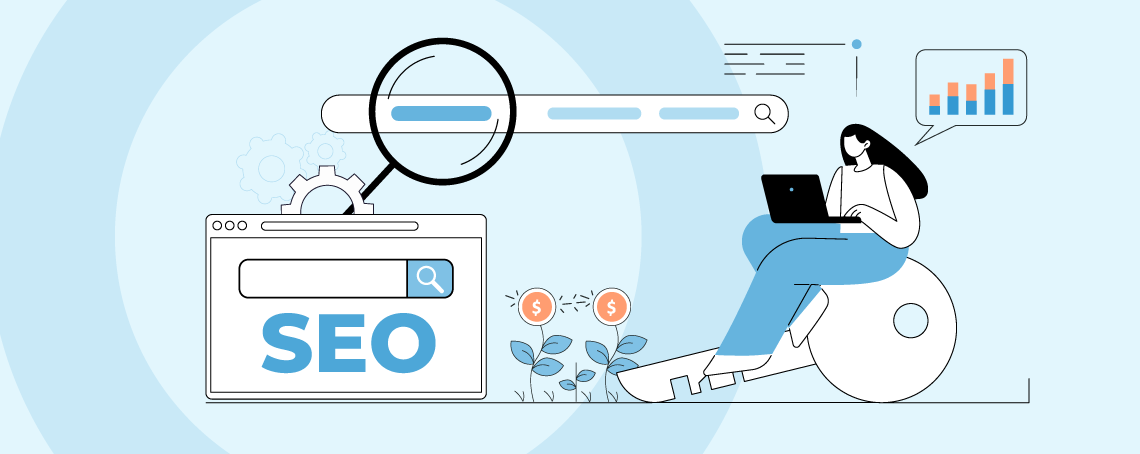
Search engine optimization (SEO) is the practice of improving the visibility and ranking of a website or web page in search engine results pages (SERPs). There are two main types of SEO: organic SEO and paid Search.
Organic SEO is the practice of improving a website’s ranking in search results without paying for advertising. This is done by optimizing the website’s content, structure, and code for relevant keywords and phrases.
Paid Search is the practice of improving a website’s ranking in search results by paying for advertising. This is done by creating and bidding on pay-per-click (PPC) ads.
In this blog post, we’ll discuss what organic SEO is, its benefits and importance for businesses.
What is Organic SEO?
Organic SEO involves optimizing a website to rank higher on SERPs without paying for ad placement. Organic search results are the natural or unpaid listings that appear on search engine results pages. The goal of organic SEO is to increase the visibility of a website in search results and drive more traffic to it. Organic SEO involves various tactics, including keyword research, content creation, on-page optimization, link building, and technical SEO.
Several techniques and tactics may be used to get a higher position in search engine results pages (SERPS). The term “organic SEO” is used to describe the practice of improving a website’s visibility in search engine results using methods other than artificial means, such as the use of keyword stuffing, paid advertising, or paid links.
Organic search engine optimization (SEO) seems to be a wiser investment than paid advertising due to its low cost.
31% of SEO experts polled in 2021 said the organic user behavior of their content had the most influence on their sites’ search engine rankings in the year before the study. First noted by 32.8% of respondents were on-page components like meta titles and descriptions.
7 Key Tips on How to Increase Organic Traffic to Website
Finding the best Organic SEO agency to partner with can feel overwhelming, especially if you’re not familiar with the nuances of search engine optimization (SEO).
Keep reading to discover the secrets behind maximizing your website’s organic traffic and climbing the ranks of search engine results pages (SERPs).
Optimize Your Content for Relevance and Value
One of the most important factors influencing your website’s search engine ranking is the value and relevance of its content. To achieve optimal results, focus on providing unique, practical, and engaging information that addresses the needs of your target audience.
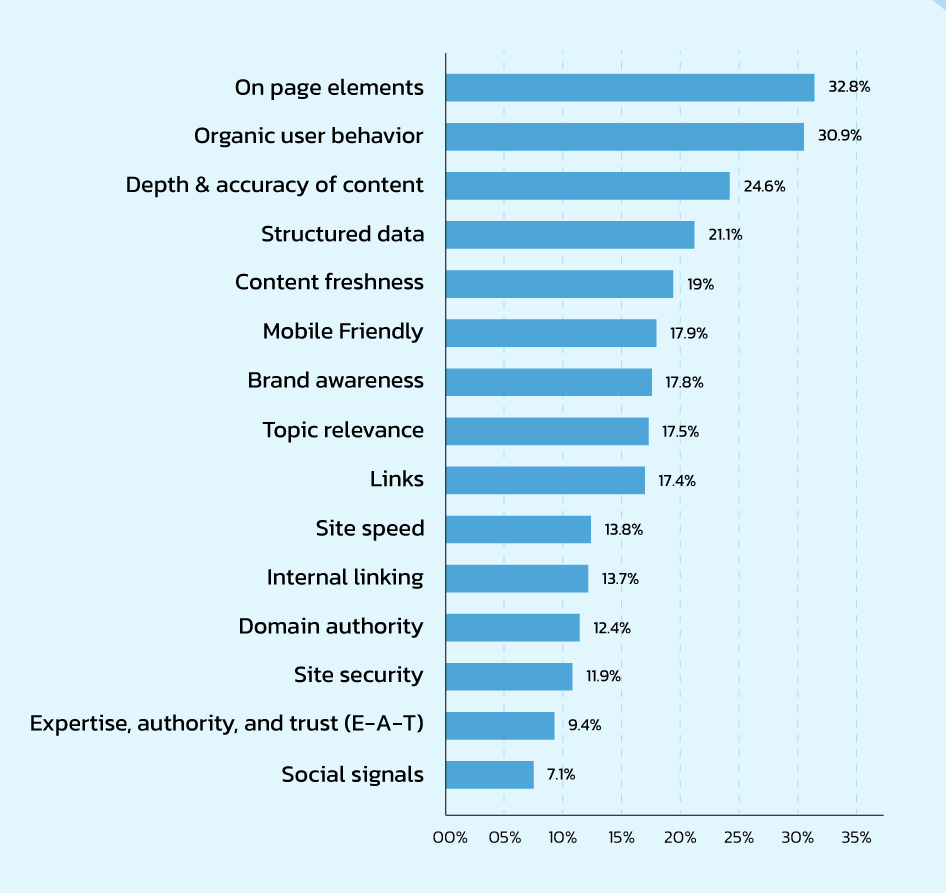
Additionally, ensure your content is well-structured, easy to read, and includes relevant keywords that accurately describe your offerings. Remember, search engines priorities websites that consistently deliver high-quality content, so invest time and effort into crafting exceptional articles, blog posts, product descriptions, and other resources.
Leverage Local SEO Strategies
Local SEO refers to optimizing your website to appear prominently in searches conducted by people near your physical storefront or service area.
You can improve your visibility and capture more nearby customers by focusing on local keywords, directory listings, reviews, and map placements. Studies show that about 70% of all mobile searches relate to location, making local SEO essential for any business with a brick-and-mortar presence.
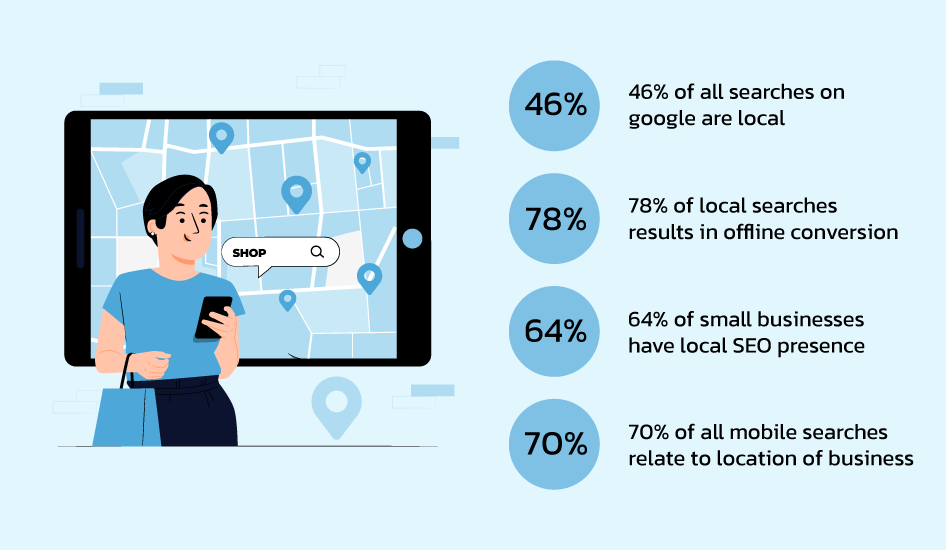
To incorporate local SEO as part of your broader Organic SEO services initiatives, consider implementing the following strategies:
- Claim and Optimize Listings on Major Directories: Ensure your business appears on popular directories like Google My Business, Bing Places, Yahoo Local, and Apple Maps. Accurately fill your profile with up-to-date information, photos, and videos to increase your visibility and credibility.
Make sure also to monitor and respond to customer reviews on these platforms to foster positive interactions and bolster your reputation.
- Utilize Geotargeted Keywords: Integrate location-based keywords throughout your website’s content, meta tags, URLs, and internal linking structure. This helps search engines understand the geographic context of your offerings and improves your odds of showing up in relevant queries.
However, be careful not to over stuff your copy with excessive mentions of cities or regions, as this may harm your SEO performance.
- Encourage Customer Reviews and Testimonials: Positive feedback from satisfied clients enhances your reputation and influences search engine rankings.
Prompt customers to leave reviews on platforms like Google, Facebook, Yelp, or industry-specific sites. Showcase glowing testimonials on your website and use stars or badges to highlight your superior ratings.
Utilize Social Media Channels to Amplify Your Message
While social media might not directly impact your search engine rankings, it remains an indispensable tool for expanding your digital footprint and engaging with potential customers.
By sharing informative content, responding to comments and messages promptly, and actively participating in relevant conversations, you can build trust and credibility among your followers. This, in turn, increases the likelihood they’ll visit your website, share your content with others, and eventually become loyal patrons.
So don’t underestimate the power of platforms such as Facebook, Twitter, LinkedIn, Instagram, and Pinterest – leverage them to amplify your message, grow your audience, and support your overall SEO efforts.
Posting Reviews and Testimonials
Posting Reviews and Testimonials is integral to your comprehensive Organic SEO services plan. Client feedback is powerful social proof that validates your products/services and builds trust with prospective buyers. When executed correctly, this tactic enables you to showcase authentic praise from real users, enhancing your online reputation, increasing visitor engagement, and ultimately driving higher conversion rates. Here are several ways to maximize the benefits of posting reviews and testimonials:
- Collect Feedback from Multiple Sources: Gather endorsements across various platforms, including your website, social media profiles, review sites, email marketing campaigns, and offline channels like direct mail or in-store signage.
The more diverse the feedback pool, the stronger the influence on your overall SEO performance.
- Display Relevant and Representative Examples: Curate a selection of reviews that resonate with your target audience while maintaining a balanced mix of positive and constructive critiques.
Avoid cherry-picking only glowing accolades since this could be disingenuous or manipulative. Instead, demonstrate transparency by showcasing a cross-section of opinions that reflect the experiences of actual customers.
- Embed Reviews Within Your Website Design: Incorporate feedback snippets, star rating systems, or eye-catching graphics throughout your site to create a seamless user experience that encourages exploration and interaction.
Place testimonials in prominent locations like headers, sidebars, or dedicated pages to maximize their visibility and influence on key metrics like bounce rate and time spent on site.
Focus on “People Also Ask” (PAA) Keywords
Targeting “People Also Ask” (PAA) Keywords is crucial to your Organic SEO services strategy. PAA is a feature introduced by Google that displays a list of related questions and suggestions beneath specific search results.
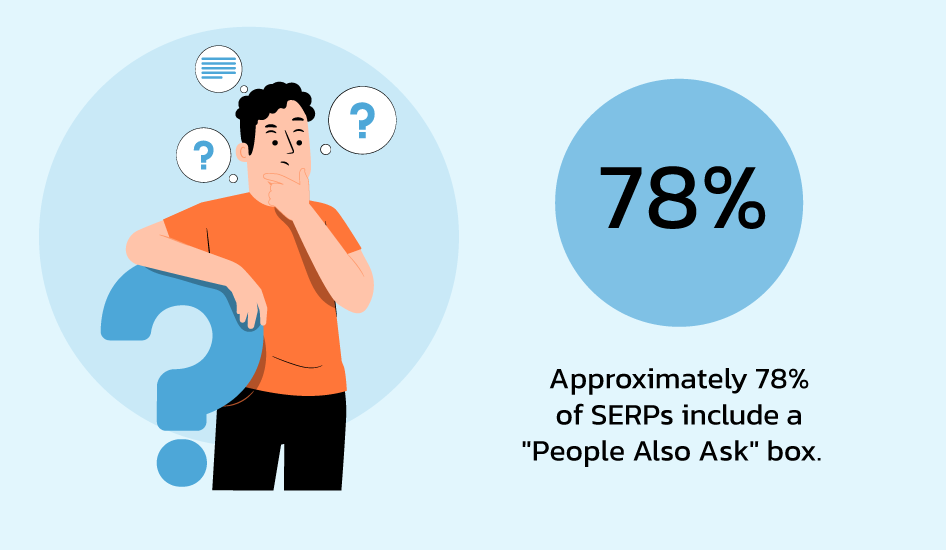
By analysing and incorporating these associated phrases into your content creation and optimization efforts, you can increase your visibility, attract additional organic traffic, and potentially gain valuable insights into emerging trends or areas of interest among your audience.
Write detailed articles, blog posts, or landing pages covering the topics that surfaced through your research. Ensure each piece addresses the original query and at least one or two corresponding PAA questions. This creates a richer user experience and increases the likelihood of capturing long-tail traffic from those seeking more extensive answers.
Adjust your title tags, meta descriptions, and URL structures to include variations of the primary topic along with one or two complementary PAA keywords. This ensures that individuals searching for related subjects quickly discover your web pages.
Analyse and Work on Keyword Gaps
Analysing keyword gaps is critical in optimizing your website for search engines and improving its overall visibility. It involves identifying the terms and phrases your target audience uses to find content similar to yours. Yet, you haven’t optimized your website to rank for those particular queries.
Addressing these gaps will help you reach a wider audience, capture more organic traffic, and grow your business.
Utilise reputable keyword research tools like Google Keyword Planner, Ahrefs, or SEMrush to gather data about the keywords your competitors are ranking for and those commonly used by your target audience. Focus on long-tail keywords that are more specific and have lower competition.
Assess your current content and determine whether it aligns with the discovered keywords. Identify any existing content that could be improved with targeted keywords or adjusted to address newly uncovered gaps.
Divide the identified keyword gaps into manageable categories based on relevance, potential traffic volume, and difficulty level. Prioritise groups according to their importance for your business objectives.
Consider producing fresh material tailored to specific keyword clusters if significant gaps exist in your content coverage. Ensure these pieces adhere to best practices for On-Page SEO, such as incorporating relevant keywords naturally within titles, headings, body copy, and meta descriptions.
For existing pages with moderate to high authority, evaluate the possibility of revamping them to include targeted keywords. Make sure any changes you make don’t negatively impact the quality or user experience of the content.
Build A Blog and Use Hashtags And Trending Topics
Building an engaging blog and strategically leveraging hashtags and trending topics form essential parts of a holistic Organic SEO services approach. Both techniques can help improve your online presence, increase brand awareness, drive targeted traffic, and foster stronger connections with your audience. Below, I explain how to build a successful blog and use hashtags and trending topics effectively:
Building a Successful Blog:
- Define Your Niche and Tone: Establish the focus area of your blog and develop a consistent voice that resonates with your target audience. This will enable you to create content that appeals specifically to your followers while differentiating your blog from others in your market.
- Consistency is Key: Establish a regular posting schedule to maintain momentum and keep visitors returning for more. Be mindful not to overload your audience with too many updates, which may lead to fatigue. Experiment with different frequencies until you settle on a cadence that works best for your audience and content type.
- High-Quality Content Matters: Produce well-written, informative, and visually appealing articles, guides, tips, news items, or other formats that cater to your target audience’s interests. Encourage discussion and sharing by prompting users to leave comments, ask questions, or share their experiences related to your content.
- Utilise Keywords Effectively: Integrate relevant keywords naturally throughout your blog posts without overstuffing or compromising readability. Use tools like Google Keyword Planner or SEMRush to identify popular search terms related to your niche and ensure your content ranks favourably in search engine results.
- Promote Your Blog: Share your posts across social media platforms, email lists, guest post sites, forums, and other channels where your target audience might be active. Leveraging relationships with influencers, collaborating with other bloggers, and participating in communities can also help expand your reach.
The Benefits of Organic SEO Services
Now after understanding what organic SEO is, let us understand and list the key benefits of Organic SEO services.
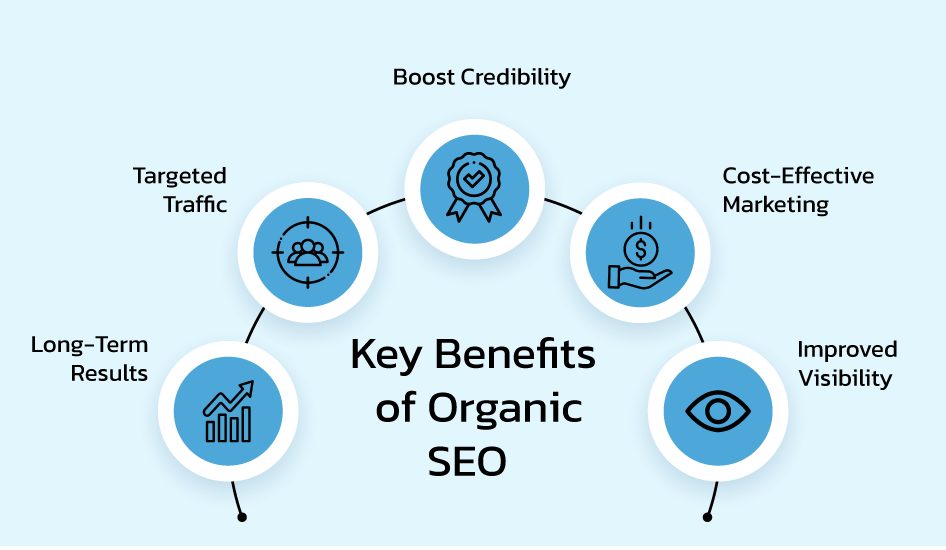
Improved Visibility
When you work with an experienced SEO agency, they’ll conduct thorough keyword research to identify terms relevant to your industry and target audience.
These keywords will then be incorporated into your website content and metadata, helping search engines understand what topics your site covers.
As a result, your site is more likely to appear at the top of search results pages – giving you valuable real estate in front of prospective customers.
Cost-Effective Marketing
Unlike paid advertising methods like Adwords PC management, organic SEO optimize your existing website to rank higher naturally. While some initial costs may be associated with hiring an agency, over time, you’ll save money compared to consistently paying for paid advertisements.
Plus, since your site ranks higher due to its relevance and quality content, visitors are more likely to trust your brand and become loyal customers.
Boost Credibility
Another advantage of organic SEO services is the improvement in credibility and trustworthiness. When your website appears at the top of search results, users tend to view it as more authoritative and reliable than those lower down on the page.
This can lead to increased conversions and, ultimately, more revenue for your business.
Long-Term Results
One of the most appealing aspects of organic SEO services is their longevity. Once your site has achieved a high ranking, you don’t need to continuously invest in other campaigns to maintain that position.
Of course, regular updates and monitoring are necessary to ensure your site stays competitive. Still, overall, the benefits of organic SEO are long-lasting.
Targeted Traffic
Lastly, organic SEO services enable you to attract targeted traffic to your site. By focusing on specific keywords related to your products or services, you can appeal to people actively searching for your offer. This increases the likelihood of converting these visitors into paying customers, resulting in a more substantial return on investment.
Conclusion
Organic SEO is a complex and ever-changing discipline. However, by following the best practices outlined in this blog post, you can improve your website’s ranking in search results and attract more visitors and customers.
If you are serious about growing your business online, then organic SEO is a strategy that you should consider. By following the tips above, you can improve your website’s visibility and ranking in search results, and attract more visitors and customers.

Nevil Bhatt
Nevil is the owner of one of the fastest-growing digital marketing agency in India. Having a great knowledge of the IT field and business management, he decided to bring a revolution in the digital world by providing valuable and customised solutions across the globe. Whether it's real or digital, he knows how to handle sustainable relationships and meaningful interactions.



